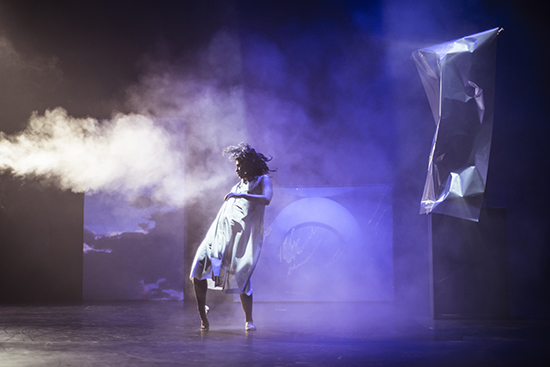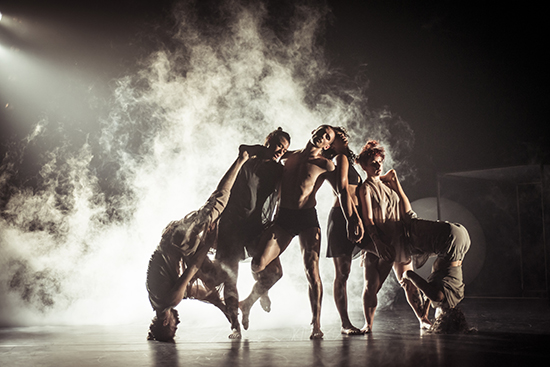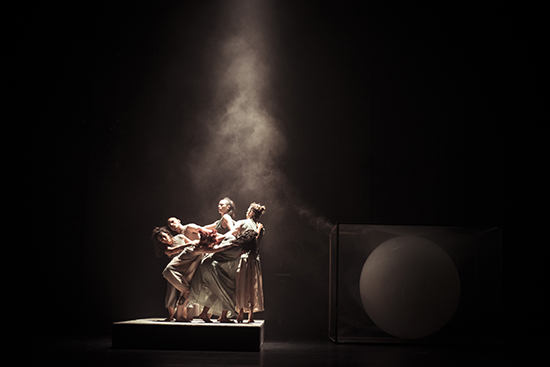The weight of abstraction
Jana Perkovic: Chunky Move, Anti—Gravity

Anti—Gravity, Chunky Move, Dance Massive
photo Pippa Samaya
Anti—Gravity, Chunky Move, Dance Massive
Early on in Anti—Gravity, a stage moment distils the feeling that will haunt me throughout this performance. On a stage busy with props that will only later come into use—screens, a large transparent box, a lift, rocks, a laptop—Sarah Ronnie Bruce stands on a small podium, occasionally releasing clouds of stage fog, and slowly speaks a list of Italian words that run along the theme of water, humidity, mist, condensation and so forth. As I struggle to understand (Bruce speaks with the incorrect syllable stresses of someone who doesn’t merely have an accent, but genuinely does not understand the words she is saying), I wonder how many others in the audience could possibly understand, she pronounces one word correctly, with a hint of a regional accent: “meccanico.”
Language, in its fullness, is not mere semiotics; it carries traces of place, of time, of climate, of person, of entire childhoods and entire cultures. The word means “mechanical.” It’s not an important word in this performance, but its perfect articulation, that draws out a fullness of lived life, exposes the perfunctory emptiness of the word shower that precedes and follows it. It will be like that with the entire production, despite my best attempts to see otherwise.
Anti—Gravity is as elegant and empty as any list of words in a foreign language, pronounced incorrectly by a non-speaker to an audience of non-understanders. It is of no use to argue that the surface is the point: we are not in Warhol territory here, superficiality is not the point, merely the unintended effect. With Chunky Move, Anouk van Dijk has created stunning, searing works by physicalising the complex felt reality of displacement, belonging and foreignness. Singaporean visual artist and filmmaker Ho Tzu Nyen deconstructs and rebuilds semiotic worlds with a serious appreciation of how much history, politics and experience are bound up with iconography. Both artists understand that a thing is never just a thing, but will always leave behind an entire associative and felt trail. And yet, the meticulous specificity that characterises the work of both artists is present in the execution of single gestures but does not extend to the raison d’etre of this collaboration, leaving viewers frustrated as we try to grasp the purpose of Anti—Gravity. We are circling the same spot, rather than moving conclusively forward, as amazing technical skill and aesthetic finesse come together not in a considered reflection or urgent feeling, but into a series of well-executed stage gestures that point to nothing beyond their own surfaces: clouds, moving bodies, balance and weight, a stage lift from which Tara Jade Samaya will launch a bucket of paper helicopters.

Anti—Gravity, Chunky Move, Dance Massive
photo Pippa Samaya
Anti—Gravity, Chunky Move, Dance Massive
There is much to observe and relish in Anti—Gravity. Samaya, one of Australia’s exceptional dancers, balances on a tall plinth, her body appearing to be without a centre of gravity, like a cat. Luigi Vescio, on an astro-turfed platform, carries rocks of varying weight, metonymically lending weight to the seemingly weightless bodies around. In a sequence of heart-piercing beauty, a duet of balance and care is reflected, sometimes in a mirror, sometimes in the body of a woman behind the mirror, dancing alone yet perfectly mirroring the movements of the female dancer holding the male dancer above ground. Van Dijk’s countertechnique is on full, glorious display in these slow movements, relishing the way gravity can be used as a force to rest on, rather than resist.
As the tempo speeds up, the six dancers come together into an arm-locked line of jumps and beats, a folkloric dance of sorts—and here again, that same semiotic emptiness of not-a-precise thing. Even in the abstracted white box of the art world, even in the international performance circuit, the ground above which the cloud of abstraction rises needs some form of banal reality.
The see-through box opens and a meteorological balloon, a large white thing, bounces out. With one dancer hanging off, another tilting the box forward and backward, the box becomes the centrepiece of a choreography of catching equilibrium. But what weather is this balloon pointing towards? Are these the invented clouds painted onto the decidedly un-humid landscape of 19th century Victoria, transposing the really-existing clouds from Van Dijk’s native north-western European landscapes into early colonial paintings? Are these the clouds that settle on Ferntree Gully in suburban Melbourne, a reminder that suburbia is not uniform despite our best attempts to make it so, and that Australia is not all desert?

Anti—Gravity, Chunky Move, Dance Massive
photo Pippa Samaya
Anti—Gravity, Chunky Move, Dance Massive
I am not asking naïve questions. Semiotics is not Esperanto. The clouds painted above an Italian altar and the clouds hiding the tops of Gao Ranhui’s misty mountains may both be pointing at the heavens, but it is not the same heavens they are pointing at. The fog that unexpectedly comes out of Ho Tzu Nyen’s visual installation in the Guggenheim Museum is different from the stage fog observed from our seats in Malthouse Theatre.
Hubert Damisch, whose five-chapter Theory of /Cloud/ (2002) has been the inspiration for Ho’s work, would have written a five-slide PowerPoint if things were that simple. The semiotic purpose of cloud historically has been to point to the ethereal realm, to be the last and most faintly physical layer separating our solid world from the world of abstraction, gods, virtue and death. Since this is precisely what Anti-Gravity purports to be about—the tension between the gravity-bound life we willy-nilly live and the weightless abstraction that eludes yet inspires us—getting the real-world part of a cosmology is important, otherwise what is the abstraction abstracting? So much common ground exists between these two artists, both keenly aware that the British sky and the sky in Asia-Pacific are not the same. Ungrounded, Anti—Gravity cannot soar.
–
Asia TOPA: Anti—Gravity, concept, direction, choreography Anouk van Dijk, co-creator, concept Ho Tzu Nyen, visual design Ho Tzu Nyen, Paul Jackson, Anouk van Dijk, lighting design Paul Jackson, composition, sound design Jethro Woodward, costume design Harriet Oxley, performers James Batchelor, Marlo Benjamin, Sarah Ronnie Bruce, Tara Jade Samaya, Niharika Senapati, Luigi Vescio; Malthouse Theatre, Melbourne, 17-26 March
RealTime issue #138 April-May 2017






